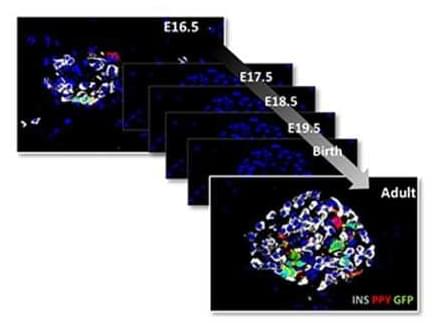The pancreas is a key metabolic regulator. When pancreatic beta cells cease producing enough insulin, blood sugar levels rise dangerously — a phenomenon known as hyperglycemia — thus triggering diabetes. After discovering that other mature pancreatic cells can adapt and partly compensate for the lack of insulin, a team from the University of Geneva (UNIGE) demonstrates that the stem cells from which beta cells are derived are only present during embryonic development. This discovery puts an end to a long-standing controversy about the hypothetical existence of adult pancreatic stem cells that would give rise to newly differentiated hormone-producing cells after birth. The scientists also succeeded in precisely defining the ‘identity card’ of pancreatic endocrine cells, which is a promising tool for the production of replacement insulin-secreting cells. These results can be read in Cell Reports and Nature Communications.
Diabetes is a common metabolic disease. It is characterised by a persistent hyperglycemia that occurs when pancreatic cells responsible for the production of insulin — the beta cells — are destroyed or are no longer able to produce this regulatory hormone in sufficient quantities. Since 2010, studies performed by the team of Pedro Herrera, a professor in the Department of Genetic Medicine and Development and in the Diabetes Centre at the UNIGE Faculty of Medicine, as well as at the Geneva Institute of Genetics and Genomics (iGE3), reveal that the other pancreatic endocrine cells — namely alpha, delta and gamma cells, which produce other hormones useful for the metabolic balance — can “learn” to produce insulin when beta cells are absent or defective. This phenomenon, observed in mice and humans, demonstrates the plasticity of pancreatic cells and paves the way to new therapeutic strategies.
